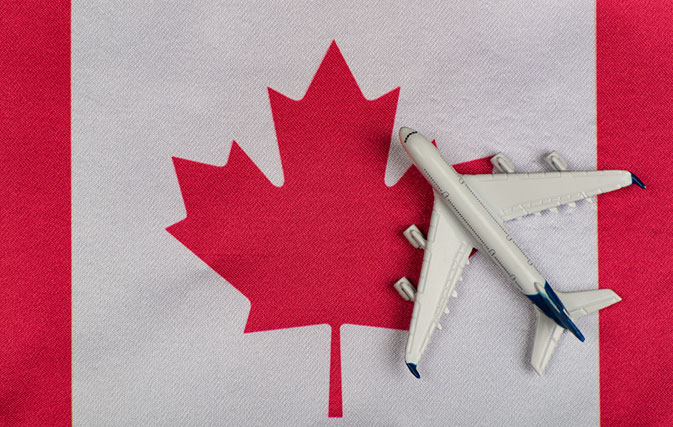TORONTO — The federal government has announced it is extending the 14-day mandatory quarantine by one month, until Sept. 30, for anyone arriving in or returning to Canada.
In place since mid-March and already extended once, the quarantine rule was set to expire Aug. 31.
Bill Blair, Minister of Public Safety & Emergency Preparedness, tweeted out the announcement this afternoon. “Our government is extending the existing restrictions on international travel to Canada by one month – until September 30, 2020 – to limit the introduction and spread of COVID-19 in our communities,” said Blair.
“Canadian citizens and permanent residents returning to Canada will continue to be subject to strict quarantine measures,” he added, and included this link.
Many in the industry have said the quarantine rule is the biggest hurdle for restarting travel and tourism, more so than the global travel advisory against all non-essential travel, along with the near-impossibility of getting COVID-19 out-of-country insurance coverage while the global travel advisory is in place.
At the same time, safety is paramount, and while many might have hoped the quarantine rule would be dropped, there is little surprise about the extension, especially as schools restart next month, bringing more exposure and potential for community transmission, and public health officials wait to see if the fall and winter months bring a second wave of COVID-19.
NO PATH TO EASING RESTRICTIONS
Brett Walker is General Manager, Collette Vacations. He’s also chair of CATO. “The 14-day quarantine is one of many barriers to travel right now. It’s amplified to the extent we an Atlantic bubble as well – with its own 14-day quarantine,” says Walker.
“What’s maddening is that public health hasn’t laid down any requirements for easing the quarantine restrictions. We have about the same information now as we did many months ago,” says Walker.
What has changed in the last few weeks, says Walker, is that the use of rapid testing is quickly expanding in jurisdictions across the world, “yet the Public Health Agency of Canada seems unconvinced they’re safe enough for Canadians.”
Walker reiterates: “Again, I’m not here to question PHAC’s decision but our industry and all Canadians deserve more information. There literally can’t be any less.”
And while the quarantine is a huge barrier to travel, Walker says it’s made worse by so little guidance from Ottawa. “It’s the government’s lack of communication that’s fuelled the public’s fear, way beyond what’s best for public health, and to a detriment to the industry’s recovery.”
“SLOW CLIMB BACK TO NORMALCY”
Gilbert Manza, Owner, Executive Travel Services Inc. in Woodbridge, ON, isn’t surprised at all by the extension and says that if it continues much longer, “the winter travel season will not exist to any degree, there will always be people who will travel however this will be limited to people who can afford to take that much time off or just don’t care about this virus.”
Manza estimates the rebound will start in mid to late 2021, “but it will be very gradual and contingent on a vaccine or medications that will treat this virus. All in all we are in for the long haul unfortunately, in my opinion, it will be a slow climb back to normalcy.”
“A BLANKET APPROACH IS NOT REASONABLE”
Flemming Friisdahl, founder of The Travel Agent Next Door, says he’s talked to close to 10 MPs from across Canada based on agent partners setting up the calls, and he also notes that the Association of Canada Independent Travel Advisors has had close to 50 calls, waiting to hear if the quarantine will be extended.
“The feeling is that, in fairness, the government wants to keep Canadians safe,” says Friisdahl.
But is Canada being overly cautious? “I very much subscribe to not opening the borders with the USA, or Brazil or India (just to name a few) as these countries are not doing a strong enough job in containing Covid-19,” says Friisdahl. “But if we look at some countries that have fewer cases per million, like Turkey, Austria, Denmark, Croatia, Greece and there are about 100 more countries plus that have fewer per millions. Why not allow Canadians to travel there?”
As he points out, “if I can go between B.C. and Ontario, then why not allow me to go to these 100 countries that are doing better than us? The 14-day quarantine makes sense to impose for many countries but not a blanket approach, it should be done selectively. Also why not provide (at the consumer’s cost) the new test that takes five minutes and costs US$5 at the airport. They take five minutes to do a test and we can all be 100% sure no one comes back and infects other Canadians, at least until we find a vaccine.”
Financially, says Friisdahl, “it seems to me it would be cheaper for the government to make this happen, then have to pay out the billions to make sure nobody infects other people. We also again need the travel advisory adjusted to applying only to countries that are not doing a great job. Again a blanket approach is not reasonable for six plus months after this all started. We need to get back to travelling safe and secure and with confidence!”

